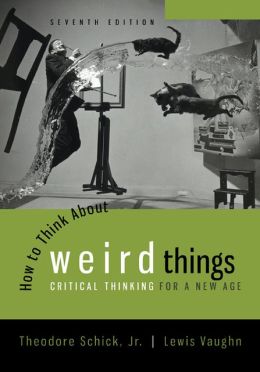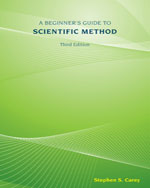Philosophy 210:
Syllabus
Syllabus: Practical Argumentation
Phil 210 - Spring 2019 - Dr. Keith Korcz
How To Reach Professor Keith Korcz:
My office is in H. L. Griffin Hall, rm. 563. My office hours are MWF 11:00 – 12:00, MW 1:00 - 2:30, and Th 12:00 – 3:00. We can also meet at other times by arrangement - just ask. The best way to contact me (or ask questions) is by e-mail at keithk@louisiana.edu. My office phone number is 482-6806.
Required Texts:
1. How To Think About Weird Things, Seventh Ed., by Theodore Schick, Jr. and Lewis Vaughn (McGraw-Hill, 2014).
2. A Beginner's Guide to Scientific Method, Fourth Ed., by Stephen S. Carey (Wadsworth, 2012).
3. Course Pack.
The course pack is available only via Moodle.
Assignments:
TAKE-HOME QUIZZES: There will be 7 take-home quizzes, six each worth 5% of the course grade, and the lowest grade counting as extra credit. Some of these will involve doing exercise problems and others will involve writing short papers. While 5% may not seem like a lot, it amounts to half a letter grade in the course (and taken together they constitute nearly 1/3 of your course grade), so you are strongly encouraged to make sure you do well on them.
IN-CLASS EXAMS: There will be two in-class exams each will be worth 20% of your course grade, and a cumulative final exam worth 30% of your course grade. The exams will consist primarily of short answer and multiple choice questions. However, all make-up exams will be primarily essay. The exams will cover both lectures and assigned readings (material in lectures and assigned readings will not always overlap). All exams are closed book/closed note.
Grading:
The course grades will initially be determined according to the standard scale, i.e., 90-100% = A, 80-89% = B, 70-79% = C, 60-69% = D, 59% and below = F, and then may be modified as follows: Course grades might be curved, but, if so, the curve would not be such that any student's grade is lowered. Such factors as improvement over the length of the course, class participation, etc., may be taken into consideration, especially where doing so may improve a borderline grade. You must complete all three exams to receive a passing grade (i.e., a grade other than F, NC or U).
Class Policies:
Missing Class: If you must miss class, for whatever reason, it is your responsibility to get class notes from another student. If you wish your absence to be excused, promptly provide me with an appropriate excuse, e.g., illness requiring medical attention, participation in certain university-sanctioned events, dangerous weather, etc. For every five unexcused absences or partial absences, your course grade will be dropped by a letter grade.Disability Accommodations:
Missing Assignments: If you miss an assignment due date, you must notify me within one week of either the due date or the cessation of a medically documented persistent vegetative state in order to make up the assignment. Missed assignments can be made up for full credit only if an appropriate excuse is promptly provided. An unexcused late assignment will be dropped 2/3 of a letter grade per day it is late.
Classroom: Disruptive or persistent distracting classroom behavior (e.g., use of phones, etc.) may result in your being dropped from the class, at the discretion of the instructor.
Academic Dishonesty: All assignments for this class must be completed individually, and any instance of academic dishonesty (e.g., cheating, plagiarism, furnishing false information regarding absences, etc.) will be sufficient to fail the course.
Unauthorized Websites: Neither lectures nor any class materials may be posted on the internet or otherwise published. Students who rely on internet sites (other than my own, listed below) or search engines for class notes, quizzes, study guides, etc., tend to do poorly in my classes. Such sites are often unreliable, and they prevent you from learning valuable note-taking and study skills. Do not use them. In general, you will get much more out of your classes if you do your own work.
University Policies: Be sure you are familiar with all university policies described in the UL Lafayette Undergraduate Bulletin and Code of Student Conduct.
Students needing academic accommodations for a disability must first be registered with the Office of Disability Services (ODS) to verify the disability and to establish eligibility for accommodations. Students may call 337-482-5252 or visit the ODS office in the Conference Center/Agnes Edwards Hall, room 126. Once registered, students should then schedule an appointment with the professor to make appropriate arrangements. If your needs are not being met for any reason, inform the instructor and ODS as soon as possible so that we may rectify the problem.
Internet Resources:
I strongly recommend taking advantage of the following resources! My Philosophy 210 Home Page contains links to an on-line syllabus (which contains numerous links to home pages of authors we'll be reading, readings available on-line, etc.), study aids, links to sites on paranormal phenomena, and other resources you will find helpful. The web address is: http://www.ucs.louisiana.edu/~kak7409/210Home.html.
My How To Survive Your First Philosophy Course pages contain useful information about what I look for when grading assignments, how to study for my exams, reading philosophy, taking notes, doing research in philosophy, etc. The web address is: http://www.ucs.louisiana.edu/~kak7409/Survival.html.
My home page contains links to all my course home pages, extensive links pages on philosophy, general research, fun sites, and lots of other information. The web address is: http://www.ucs.louisiana.edu/~kak7409.
A Moodle page will be activated for this course at the beginning of the semester.
Emergency Evacuation Procedures:
A map of this floor is posted near the elevator marking the evacuation route and the Designated Rescue Area. This is an area where emergency service personnel will go first to look for individuals who need assistance in exiting the building. Students who may need assistance should identify themselves to the teaching faculty.
COURSE CALENDAR & PLANNED READING ASSIGNMENTS*
You should complete each of the readings before they are discussed in class. Some of the readings are difficult, and you may find that you need to re-read them after they have been discussed in class in order to fully understand them. Due dates for take-home quizzes will be given in class.
(CP) = Course Pack, only available via Moodle
(WT) = How To Think About Weird Things
(BGSM) = Beginner's Guide to Scientific Method
Topic 1: Knowledge, Belief and Truth
a. How Beliefs Change. (WT): Chapter 1, "Introduction: Close Encounters With The Strange," & p. 118-137; (CP): "The Propensity to Believe" by James E. Alcock and "Houdini's Impossible Demonstration" by Massimo Polidoro.
Wednesday, January 21 – Martin Luther King, Jr. Day - No Classes.
b. Is Truth Relative? (WT): Chapter 8, "Relativism, Truth and Reality."
c. The Ethics of Belief. (CP): "Obedience to Authority" by Stanley Milgram.
Topic 2: Ways of Knowing: Problems and Prospects
a. Overview. (WT): Chapter 4, "Knowledge, Belief and Evidence."
b. Introspection. (no readings).
c. Pure Reason. (WT): p. 33-42 and Chapter 2, "The Possibility of the Impossible."
d. Intuition. (CP): "The Psychology of Intuition" by Edward Wisniewski.
e. Observation and Personal Experience. (BGSM): Chapter 2, "Observation"; (WT): Chapter 5, "Looking for Truth in Personal Experience" (p. 96-111 only); (CP): "'Cold Reading': How To Convince Strangers That You Know All About Them" by Ray Hyman, "A Psychological Case Study of 'Demon' and 'Alien' Visitation" by Andrew D. Reisner.
EXAM #1: WEDNESDAY, FEBRUARY 20.
f. Induction. (WT): p. 138-140 and 42-48; (CP): "Inconsistent Decisions and Bad Bets" by Stuart Sutherland, "Hidden Messages and the Bible Code" by David E. Thomas, "God's Number Is Up" by Michael Shermer.
Monday, March 4 through Wednesday, March 6 – Mardi Gras - No Classes.
g. Memory. (WT): p. 111-117; (CP): "Creating False Memories" by Elizabeth F. Loftus.
h. Mysticism. (no readings)
Topic 3: Evaluating Testimony
a. Rhetoric vs. Reason. (no readings)
b. Anecdotal Evidence. (CP): "Eyewitness Testimony and the Paranormal" by Richard Wiseman, et al, "Why Bogus Therapies Seem to Work" by Barry L. Beyerstein, "They See Dead People – Or Do They?: An Investigation of Television Mediums" by James Underdown, "Fakers and Innocents" by James Randi; (WT): p. 141-150. In Class Video: Secrets of the Psychics.
Monday, March 18 – Advising for FA19 begins.
c. Appeals to Authority. (CP): "Appeal to Authority" by Bruce N. Waller.EXAM #2: WEDNESDAY, MARCH 27.
d. Additional Fallacies. (WT): p. 49-57.
Topic 4: Causation and Causal Reasoning
a. Kinds of Cause. (no readings)
b. Mill's Methods. (CP): "Causality" by David Kelley.
c. Testing for Causation. (BGSM): Chapter 1, "Science," and Chapter 5, "Establishing Causal Links"; (CP) "The Double-Blind Gaze" by Steven Bratman.
Monday, April 15 Friday, April 19 – Spring Break - No Classes.
Topic 5: Explanation and Scientific Method
a. Overview: The Scientific Approach. (CP): "Wonder and Skepticism" by Carl Sagan.
b. Scientific Explanation. (BGSM): Chapter 3, "Explanation," and Chapter 4, "Experimentation"; (WT): Chapter 6, "Science and its Pretenders.”
c. Week of Nov. 26, Science and Pseudoscience. (CP): "How to Sell a Pseudoscience" by Anthony R. Pratkanis; (WT): Chapter 7, "Case Studies in the Extraordinary"; (BGSM): Chapter 6, "Fallacies in the Name of Science"; (CP): "Faith Healing" by Joe Nickell.
LAST DAY OF CLASSES: FRIDAY, MAY 3.
FINAL EXAM (IN REGULAR CLASSROOM): TUESDAY, MAY 7, FROM 2:00 PM TO 4:30 PM.
*Note: Assignment due dates, topics, readings and procedures are tentative and may change at the discretion of the instructor.
SOME HELPFUL TIPS:
1. On class evaluations, students often state that they would tell friends planning to take my classes that good class attendance and good class notes are essential to doing well on the exams.
2. Keep up with the readings - they further explain and help you to remember the issues you'll be tested on.
3. If you're having trouble understanding course material, do not hesitate to discuss it with the instructor!


